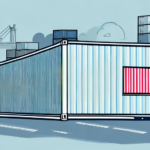Understanding Delivery Pods
Delivery pods, also referred to as smart lockers or automated parcel terminals, are innovative unmanned stations designed to streamline the logistics and delivery process for businesses and consumers alike. These centralized hubs facilitate the efficient receipt and dispatch of packages, significantly reducing the reliance on traditional delivery methods that often involve human intervention, which can lead to increased costs and potential delays.
How Delivery Pods Function
Equipped with advanced technologies such as barcode scanners, RFID tags, and secure access systems, delivery pods provide a seamless package management experience. When a package is delivered to a pod, the recipient receives a unique access code, allowing them to retrieve their package at their convenience. This system not only enhances package security but also ensures that deliveries are accessible outside of standard business hours, offering greater flexibility for both businesses and consumers.
Types of Delivery Pods
- Residential Pods: Installed in apartment complexes and residential areas to cater to individual households.
- Commercial Pods: Located in office buildings and business districts to serve employees and businesses.
- Outdoor Pods: Designed to withstand various weather conditions, making them suitable for public spaces and retail centers.
Benefits of Delivery Pods for Businesses
Implementing delivery pods offers numerous advantages for businesses, ranging from operational efficiency to enhanced customer satisfaction.
Operational Efficiency
Delivery pods streamline the package handling process by automating deliveries and pickups, thereby reducing the need for manual labor. According to a report by McKinsey & Company, automation in logistics can lead to a 20-30% increase in operational efficiency. This boost is achieved by minimizing the time and resources required to manage deliveries, allowing businesses to focus on other core activities.
Cost Savings
By reducing the need for human labor and minimizing delivery vehicle usage, businesses can achieve significant cost savings. A study by the International Transport Forum found that automated delivery systems like delivery pods can reduce delivery costs by up to 25%, primarily through lowered labor and fuel expenses.
Enhanced Customer Satisfaction
Delivery pods offer customers the convenience of flexible pickup times and secure storage for their packages, contributing to a more positive delivery experience. According to a survey conducted by Statista, 68% of consumers prefer having multiple delivery options, including smart lockers, to accommodate their schedules.
Cost-Effectiveness of Delivery Pods
Delivery pods are a highly cost-effective solution for businesses of all sizes, particularly for small and medium-sized enterprises (SMEs) that may have limited financial resources.
Initial Investment and Long-Term Savings
The initial investment required for installing delivery pods can be offset by the long-term savings achieved through reduced labor costs, fuel expenses, and vehicle maintenance. According to Forbes, businesses can see a return on investment within two to three years due to the significant cost reductions associated with automated delivery systems.
Centralized Delivery System
Since delivery pods serve as centralized points for package distribution, businesses can reduce the number of required delivery vehicles. This not only saves money but also reduces the environmental impact associated with vehicle emissions.
Enhancing Customer Experience with Delivery Pods
Delivery pods significantly improve the overall customer experience by offering flexibility, convenience, and security in the delivery process.
Flexible Pickup Times
Customers are no longer constrained by traditional delivery schedules. With delivery pods available 24/7, customers can retrieve their packages at any time that suits them, enhancing overall satisfaction.
Secure and Contactless Deliveries
The contactless nature of delivery pods adds an extra layer of safety, particularly important in times when social distancing is crucial. Additionally, the secure locking mechanisms reduce the risk of package theft.
Environmental Impact of Delivery Pods
Adopting delivery pods contributes to reducing the carbon footprint of businesses by optimizing delivery routes and minimizing vehicle usage.
Reduced Vehicle Emissions
By centralizing deliveries, the number of individual delivery trips is significantly reduced. This leads to lower fuel consumption and decreased greenhouse gas emissions. According to the Environmental Protection Agency, transportation accounts for approximately 29% of total U.S. greenhouse gas emissions, making reductions in this sector crucial for environmental sustainability.
Sustainable Materials and Energy
Many delivery pods are constructed from sustainable materials and are increasingly powered by renewable energy sources. This not only reduces the environmental impact but also aligns with corporate sustainability goals.
Future Trends in Delivery Pods Technology
The delivery pod industry is poised for significant advancements, driven by technological innovations and evolving consumer demands.
Integration with Autonomous Vehicles
The future of delivery pods includes integration with autonomous vehicles and drones, further enhancing delivery efficiency and reducing the need for human intervention. Companies like Tesla are pioneering autonomous delivery solutions that could work in tandem with delivery pods to create a more streamlined logistics network.
Advanced Security Features
As technology progresses, delivery pods are expected to feature even more advanced security measures, including biometric access and real-time monitoring, to ensure the utmost protection of packages.
Smart Integration with IoT
Integration with the Internet of Things (IoT) will enable delivery pods to communicate with other smart devices and systems, allowing for real-time tracking, predictive maintenance, and enhanced user interactions. This connectivity will provide businesses with deeper insights into their delivery operations, further optimizing efficiency.
Case Studies: Real-Life Examples of Businesses Benefitting from Delivery Pods
Several businesses worldwide have successfully integrated delivery pods into their logistics strategies, resulting in improved efficiency and customer satisfaction.
Amazon
Amazon has implemented its Amazon Locker system across various locations in the United States. This initiative has optimized their delivery processes by providing customers with convenient pickup points, reducing the strain on traditional delivery methods.
Yamato Transport
In Asia, Yamato Transport has installed thousands of delivery pods as part of its logistics strategy. This implementation has helped the company reduce operational costs by 40%, while also enhancing delivery speed and reliability.
InPost
In Europe, InPost, a Polish postal service company, has deployed over 6,000 delivery pods across the country. This expansion has significantly improved the efficiency of their delivery network and increased customer satisfaction rates.
Conclusion
Delivery pods offer businesses a cost-effective, efficient, and sustainable solution for optimizing their delivery processes. With the various benefits they provide, including enhanced operational efficiency, cost savings, improved customer satisfaction, and positive environmental impacts, it's no surprise that an increasing number of businesses are adopting delivery pods as a core component of their logistics strategy. As technology continues to advance, delivery pods are set to become even more integral to the future of the logistics and delivery industry, paving the way for a more efficient and sustainable future.






















